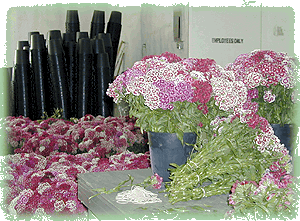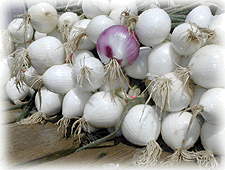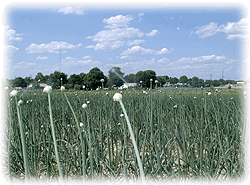| A compilation of 38 different activities and resource ideas.
Objectives
Students will learn about today’s diversity of farm crops, the variety of farming techniques, and the challenges facing farmers today. The Activity Guide is arranged by skill sections, each with its own objectives and activity ideas. The following are representative of the guide’s content:
Part 1
- Skill A: New Jersey produces about 80 varied types of fruits and vegetables. The leading fruit counties in New Jersey are Gloucester and Atlantic. Most of the state’s vegetables come from South Jersey including: Cumberland, Gloucester, Atlantic and Salem counties. Most food factories are found in South Jersey.
- Skill B: Many New Jersey farmers stay in
 agriculture by growing or raising special crops that include: flowers, ornamentals, sod, bees, oysters, and a few others. agriculture by growing or raising special crops that include: flowers, ornamentals, sod, bees, oysters, and a few others.
- Skill C: Livestock raised in New Jersey include: dairy cows, leghorn chickens, many breeds of horses, prize and beef cattle, goats, sheep and pigs.
Part 2
- Skill A: Farmland loss results from changes in the agricultural products market, the rise of property values, competition for land, and pressure from non-farm neighbors who may not accept the discomforts caused by farming.
- Skill B: Agriculture must be supported and protected as it benefits everyone.
|
Materials
Farming, Garden State Style ––Activity Guide for Teachers and accompanying Video –– is available to borrow from your county Audio-Visual Aides Commission (AVA). It is listed in their catalog which is located in each school district that participates in their lending library service.
Making Connections
 ag-ri-cul-ture n. ag-ri-cul-ture n.
Raising of livestock; farming and cultivating the crops.
farm n.
Land that is cultivated for agricultural production; land used to breed and raise domestic animals; the area of water used for breeding and raising of a particular type of aquatic animal, such as fish; the raising of livestock or crops as a business.
An excerpt from Historic Themes and Resources book, Chapter 4 –– Agriculture (page 57)
Agriculture has been a way of life in South Jersey since the eighteenth century, and all three counties have remained devoted to some agricultural pursuit into the twentieth century. The first farmers here were the Lenni Lenape Indians who cleared land by burning underbrush and girdling trees. Among the plants they domesticated and cultivated were several varieties of corn –– flint corn, popcorn, and sweet corn, kidney and lima beans, pumpkin, Jerusalem artichoke, sunflower, and tobacco. They also harvested wild rice and gathered chestnuts, walnuts, hazelnuts, hickories, and butternuts. Indians taught the first whites about such indigenous wild foods, and they are credited with providing the newcomers with many of today’s popular commercial products: blueberries, strawberries, cranberries, and sugar maples.
The history of agriculture and farming in the Down Jersey region is long and varied. The close connections to the land are exemplified throughout the development of the many types of farms that played an important role in shaping the features of the land, as well as the lives of the people who lived and worked the land. Agriculture helped shape and form the character of the region from the architectural features and design of buildings, to the diversity of ethnic cultural backgrounds of the people through the influx of migrant workers. Truck farming ––growing vegetables and fruit and then sending to them to urban markets in Philadelphia and New York –– was of particular significance to the region where many crops were grown and then transported via horse-drawn wagon, railroad, and later trucks.
Background
Historic Themes and Resources book, Chapter 4 ––Agriculture (pages 57-76), presents a complete and comprehensive historical look at agriculture in the Down Jersey region.
The activity guide and video highlighted here is primarily focused on present day reliance on agricultural products. In addition to the 38 activities included, the guide also includes many other resource contacts and ideas for further discussion and involvement with the topics associated with agriculture.
 In the Foreword, Sandi Riley (the author) writes: In the Foreword, Sandi Riley (the author) writes:
The activities presented in this book were designed to help students learn of New Jersey’s agricultural greatness achieved with a limited amount of space, and the importance of preservation and technology for the future. Students will broaden their awareness of Contemporary and Future farming techniques through the activities (tried and true) gathered into this book. Together we can let everyone know the importance of our Agricultural Bounty and ways to protect it.
The 4th grade classes of Mt. Pleasant School in Millville (Cumberland County) worked to produce the video which shows them involved with a variety of activities presented in the packet. They visited a field farm, container farm, hydroponic farm and an aquaculture facility in the video.
Please download the PDF for the complete Lesson Plan.
| Resources
In Farming –– Garden State Style, many of the activities simply direct the teachers and/or students to use the phone book to begin their research: landscape architects, farms, nurseries, organizations, government offices, etc. There are many opportunities in Down Jersey to include and obtain information from local resources and people.
Local Agricultural Agent through Rutgers Cooperative Extension Service
NJ Department. of Agriculture, CN 330, Trenton, NJ 08625
Person to Person –– Farmer to Student is a directory of farmers in New Jersey, organized by county, who are willing to visit classrooms for presentations or offer tours of their farms. It is available from the NJ Agricultural Society, CN 331, Trenton, NJ 08625 or at (609) 394-7766.
They also produce a newsletter, "The Garden View," New Jersey’s Ag in the Classroom Newsletter.
They also have an annual grant program for teachers.
The National Gardening Association also has an annual grant program for teachers for tools, seeds and garden products valued at an average of $750 for starting a garden. For an application, call (800) 538-7476; E-mail [email protected], or visit their website at http://www.garden.org. |
|


 agriculture by growing or raising special crops that include: flowers, ornamentals, sod, bees, oysters, and a few others.
agriculture by growing or raising special crops that include: flowers, ornamentals, sod, bees, oysters, and a few others.
 ag-ri-cul-ture n.
ag-ri-cul-ture n. In the Foreword, Sandi Riley (the author) writes:
In the Foreword, Sandi Riley (the author) writes: